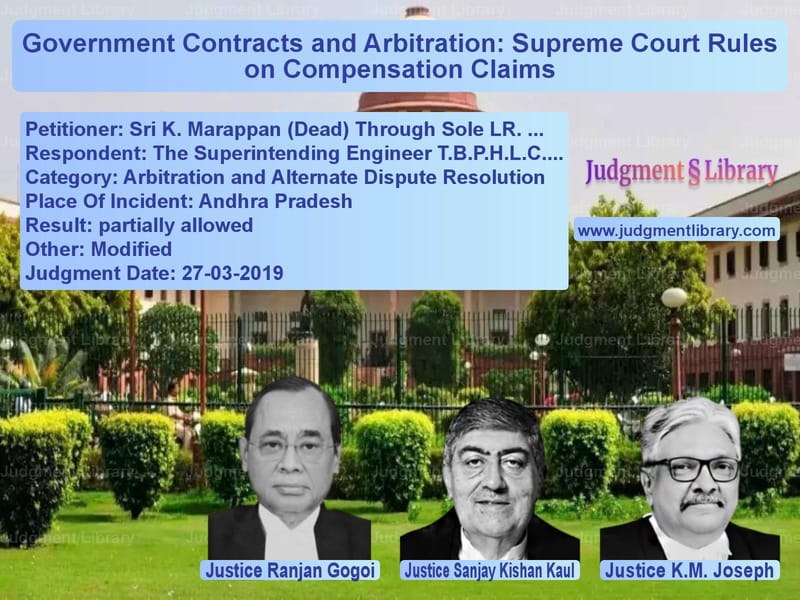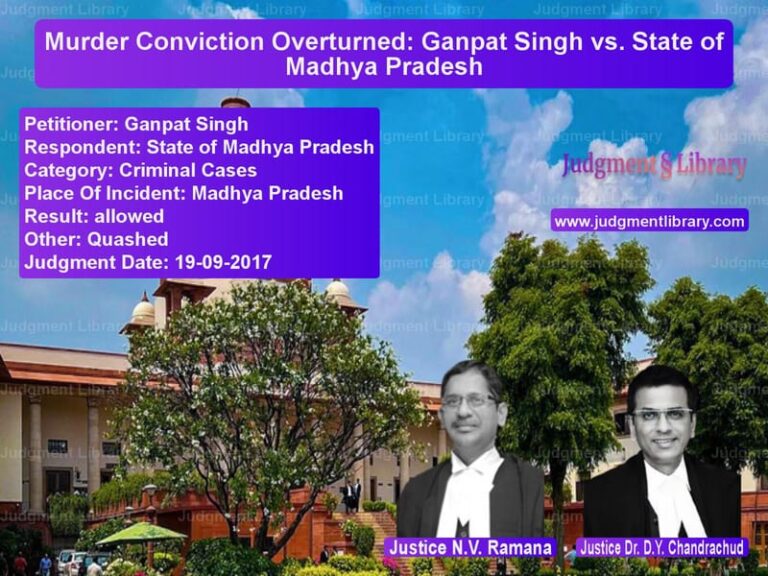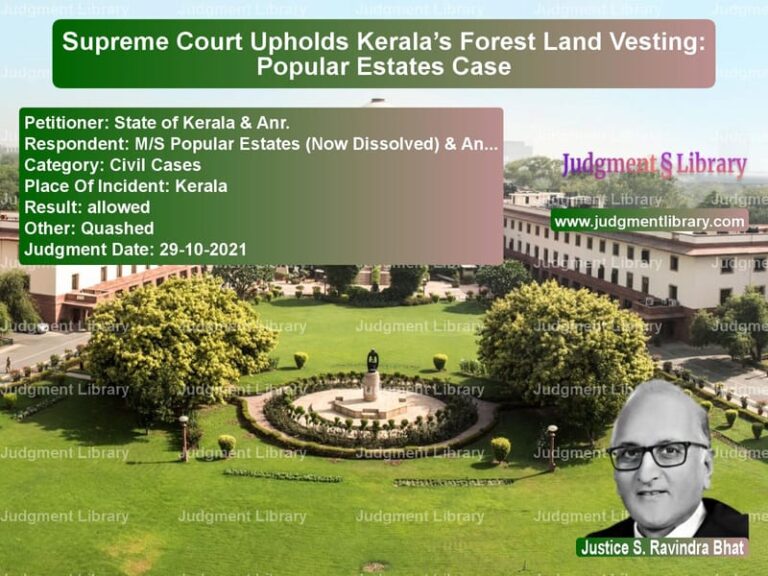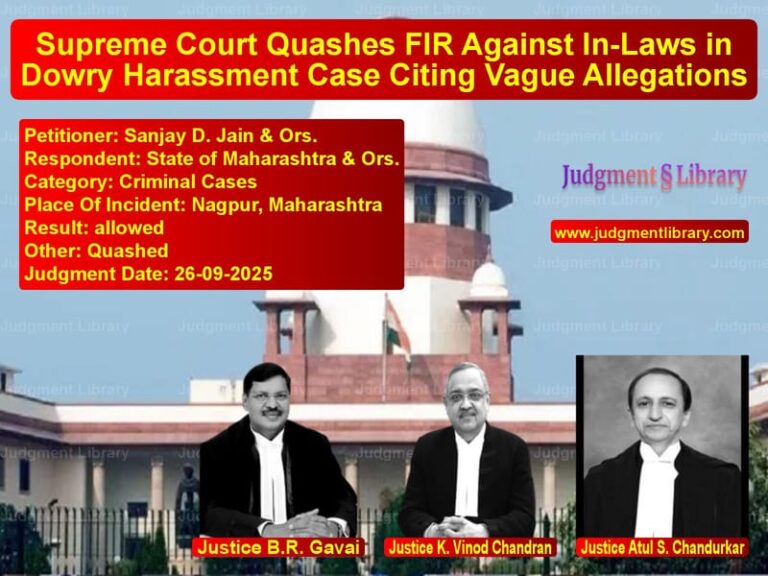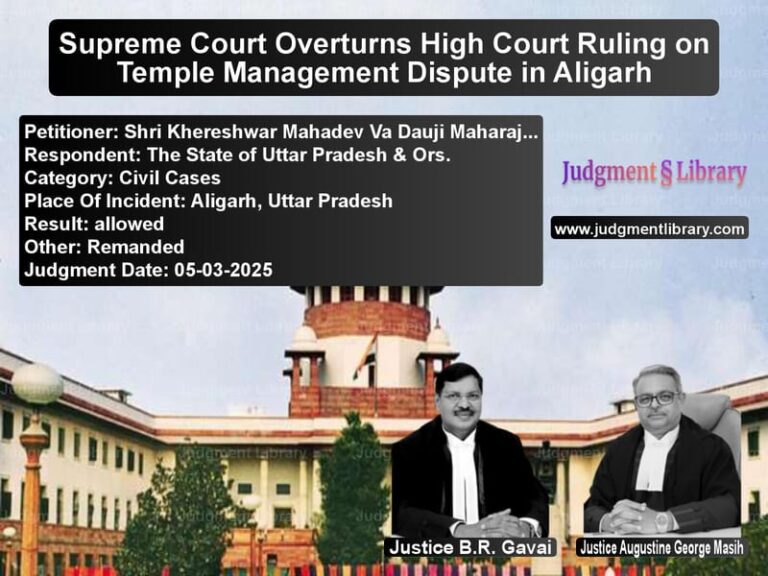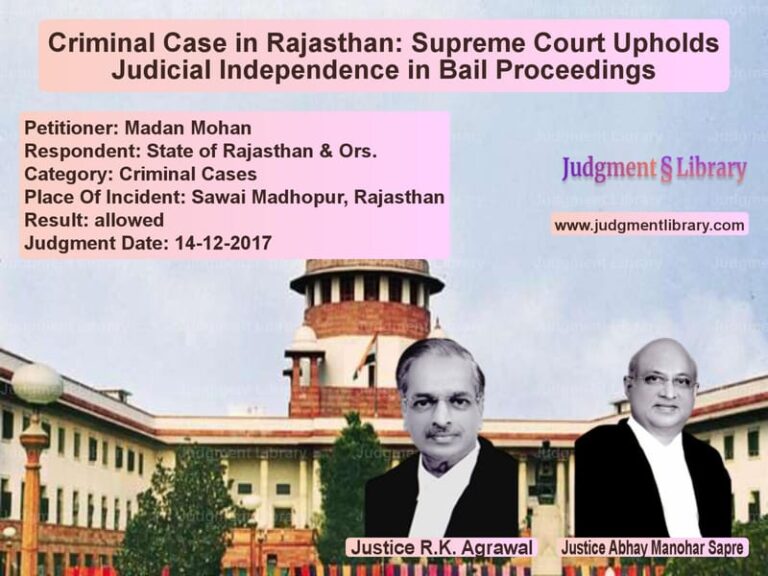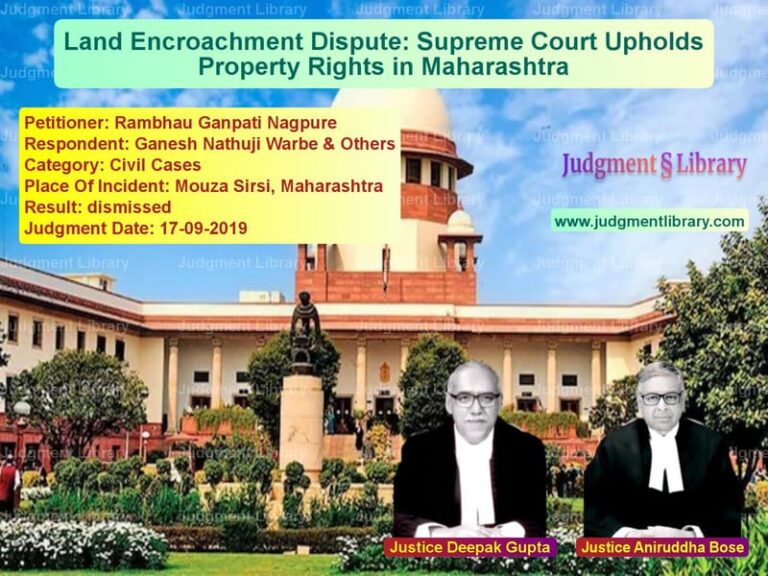Government Contracts and Arbitration: Supreme Court Rules on Compensation Claims
The case of Sri K. Marappan (Dead) Through Sole LR. Balasubramanian vs. The Superintending Engineer T.B.P.H.L.C. Circle Anantapur is a landmark decision regarding disputes arising from government contracts, arbitration proceedings, and the legal enforceability of compensation claims. The Supreme Court of India, in its judgment dated March 27, 2019, examined the role of arbitration in government contracts, the extent to which compensation can be awarded under contract clauses, and the limits of judicial intervention in arbitration awards.
The case originated from an irrigation project dispute in Andhra Pradesh. The appellant, a contractor, claimed compensation for additional costs incurred due to delays in material supply by the government. The Supreme Court reviewed the arbitration award, analyzed the validity of contract clauses that restricted compensation claims, and ruled in favor of enforcing the contract terms strictly.
Background of the Case
The dispute arose from an irrigation project in Andhra Pradesh, where the appellant, Sri K. Marappan, was awarded multiple contracts by the government for the construction of canal works. The contracts included specific provisions regarding material supply, project timelines, and compensation claims.
Key facts:
- A tender was invited on September 18, 1978 for the construction of an irrigation project.
- The appellant was awarded three contracts:
- Agreement No. 10/78-79 (March 10, 1979)
- Agreement No. 11/78-79 (March 10, 1979)
- Agreement No. 14/79-80 (June 28, 1979)
- The contract required completion within 18 months.
- The government was responsible for providing certain construction materials.
- Due to delays in material supply and unforeseen circumstances, the appellant incurred additional costs and sought compensation.
Legal Issues Raised
- Was the contractor entitled to additional compensation beyond what was contractually permitted?
- Could arbitration awards override contract clauses that restricted compensation?
- What was the legal significance of Clause 59 in barring compensation claims?
- What are the limits of judicial interference in arbitration awards?
Arguments by the Petitioner (Sri K. Marappan)
The appellant argued:
- The arbitrator’s award was valid since it was based on actual costs incurred.
- The contract clauses did not explicitly bar all claims for additional compensation.
- The government’s failure to supply materials on time justified additional payments.
- The arbitrator had the authority to assess damages based on fairness and equity.
Arguments by the Respondent (Superintending Engineer, T.B.P.H.L.C.)
The respondent countered:
- Clause 59 of the contract explicitly barred any compensation for delays and hindrances.
- The arbitrator exceeded his jurisdiction by awarding compensation beyond the contract’s terms.
- The government was not liable for supply delays as per the contract.
- The High Court had rightly set aside the arbitration award.
Industrial Tribunal’s Decision
The matter was initially heard by the arbitration tribunal, which ruled:
- The contractor was entitled to additional compensation due to delays in material supply.
- The compensation was calculated based on the additional expenses incurred.
- The government had failed to meet its contractual obligation to provide timely materials.
The arbitration tribunal, therefore, directed the government to compensate the appellant.
High Court’s Decision
The government challenged the arbitration award in the Andhra Pradesh High Court, which ruled:
- The arbitration award was contrary to Clause 59 of the contract.
- The contract explicitly barred any compensation beyond what was stated.
- The arbitrator had exceeded his jurisdiction.
- The compensation award was invalid and was set aside.
Supreme Court’s Judgment
The Supreme Court upheld the High Court’s decision, ruling:
- Arbitration awards must conform to contractual terms.
- Clause 59 barred compensation for delays and hindrances.
- Judicial interference is justified when arbitrators exceed contractual limits.
- The appellant was entitled only to compensation explicitly permitted under the contract.
The Court observed:
“It is not open to a contractor to claim compensation that arises due to work delays or hindrances from any cause whatsoever. Clause 59 bars such claims.”
Key Takeaways from the Judgment
- Contractual clauses override arbitration awards.
- Compensation claims must align with contract terms.
- Judicial review is permissible when arbitrators exceed their mandate.
- Government contracts must be interpreted strictly.
- Arbitration awards cannot modify contract terms.
Conclusion
The Supreme Court’s ruling in Sri K. Marappan vs. The Superintending Engineer reinforces the principle that government contracts must be strictly interpreted according to their terms. The judgment clarifies that arbitrators cannot award compensation that is explicitly barred under the contract and that judicial intervention is warranted when arbitration awards violate contractual agreements. This decision is a crucial reference for contractors and government agencies handling disputes under the Arbitration Act.
Petitioner Name: Sri K. Marappan (Dead) Through Sole LR. Balasubramanian.Respondent Name: The Superintending Engineer T.B.P.H.L.C. Circle Anantapur.Judgment By: Justice Ranjan Gogoi, Justice Sanjay Kishan Kaul, Justice K.M. Joseph.Place Of Incident: Andhra Pradesh.Judgment Date: 27-03-2019.
Don’t miss out on the full details! Download the complete judgment in PDF format below and gain valuable insights instantly!
Download Judgment: Sri K. Marappan (Dea vs The Superintending E Supreme Court of India Judgment Dated 27-03-2019.pdf
Direct Downlaod Judgment: Direct downlaod this Judgment
See all petitions in Arbitration Awards
See all petitions in Contract Disputes
See all petitions in Judgment by Ranjan Gogoi
See all petitions in Judgment by Sanjay Kishan Kaul
See all petitions in Judgment by K.M. Joseph
See all petitions in partially allowed
See all petitions in Modified
See all petitions in supreme court of India judgments March 2019
See all petitions in 2019 judgments
See all posts in Arbitration and Alternate Dispute Resolution Category
See all allowed petitions in Arbitration and Alternate Dispute Resolution Category
See all Dismissed petitions in Arbitration and Alternate Dispute Resolution Category
See all partially allowed petitions in Arbitration and Alternate Dispute Resolution Category

